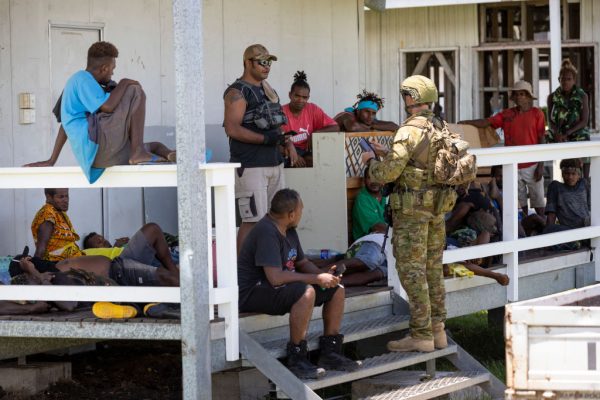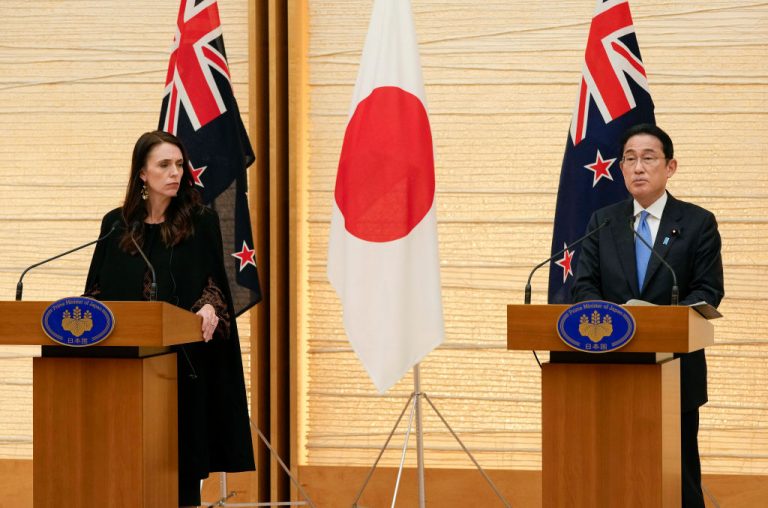Following the Solomon Islands’ confirmation that they had signed a security agreement with China, Japan announced the dispatch of a foreign vice-minister to the South Pacific island on April 25
The meeting comes amid concerns from the U.S. and its allies that the security agreement would increase Beijing’s military influence in the South Pacific region.
Kentaro Uesugi’s three-day trip to the Solomons comes days after the United States sent a senior delegation to the island, and warned that Washington would take “unspecified action,” should the security deal with China pose a threat to the U.S. or its allied interests.
The security pact, which China and the Solomons confirmed on April 19, has elicited fears that the communist regime’s People’s Liberation Army (PLA) could eventually set up a base in the country. The Solomon Islands, home to around 600,000, occupies a stretch of sea around 1,240 miles northeast of Australia.
READ MORE:
- China and Solomons Sign Security Pact, Paving Way for Possible PLA Base
- Solomon Islands Under Western Pressure to Scrap Security Deal With China
- Following Confirmed Security Deal, Leaked File Reveals China Intended to Build Naval Base in the Solomon Islands
Australian PM: ‘Red line’ must not be crossed
On April 24, Australia’s Prime Minister Scott Morrison said a Chinese military base in the Solomon Islands would cross “red line” for his government, adding that his determination to avoid a naval base there was shared not just by the U.S. and its allies, but also by the Solomons’ prime minister, Manasseh Sogavare.
Morrison said Sogavare had assured him personally that there would be no military base on the island. “This is a shared concern, not just Australia. This is Australia with regional governments,” he said.
Success
You are now signed up for our newsletter
Success
Check your email to complete sign up
Sogavare has said on multiple occasions that his government would never host any military foreign powers. “It will not be in the interest of Solomon Islands to host any naval or military base of any country, because that will immediately make Solomon Islands a military target for other countries,” Sogavare told The Solomon Times on April 6.
When asked by reporters what Australia would do in the event of a PLA base announcement in the region, Morrison declined to respond, but warned that, “We won’t be having Chinese military naval bases in our region on our doorstep.”
On April 13, Australia sent minister for International Development in the Pacific region, Zed Seselja, to the Solomons following the security draft announcement. During these talks, Seselja said he asked Solomons’ Prime Minister Sogavare to abandon the Chinese agreement.
“We have asked Solomon Islands respectfully to consider not signing the agreement and to consult the Pacific family in the spirit of regional openness and transparency, consistent with our region’s security frameworks,” Seselja said in a statement released on April 14.
Similarly, New Zealand Prime Minister Jacinda Ardern pointed to China’s growing assertiveness as a reason for concern.
While speaking to the BBC, Ardern said, “One of the reasons we’ve expressed this disappointment [is] … Australia and New Zealand both have heeded the call of the Solomons for support during recent disruption.
“And we’ve again highlighted that should any extended need exist, we are there to help and support. What gap remains that requires such an agreement with China?”

The Solomon government has sought to downplay the significance of the security agreement with Beijing.
According to a leaked file of the draft, the proposed arrangements revealed that Beijing had intentions of building a military base there as early as 2020.
The letter, which was first obtained by news.com.au, was signed by company President Rong Qian from Avic International Project Engineering Company, a Beijing-based state-owned aviation company, and was addressed to Premier Leslie Kikolo of Isabel Province in the Solomon Islands on Sept. 29, 2020.
“We, AVIC-INTL Project Engineering Company … present this letter to demonstrate our intent to study the opportunity to develop naval and infrastructure projects on leased land for the People’s Liberation Army Navy in Isabel Province with exclusive rights for 75 years,” the leaked file read.
Following the leak, U.S. officials wrote that, “If steps are taken to establish a de-facto permanent military presence, power-projection capabilities, or a military installation, the delegation noted that the U.S. would then have significant concerns and respond accordingly,” a White House readout read.
The White House added that leaders agreed to “launch a high-level strategic dialogue,” on the matter.
Meanwhile, China’s foreign minister Wang Yi denied any PLA expansion plans and said during a daily press briefing that, “We are committed to helping the Solomon Islands in strengthening its capacity to build and maintain national security,” adding that the agreement does not seek to supersede the South Pacific nation’s security ties with other nations, and will not see a Chinese military presence in the region.
China’s strategic security advancements
For years now, the Chinese regime has worked to establish a more dominant presence in the South-Pacific region, which has seen the construction of over 72 artificial island bases in the South China Sea.
So far, Beijing operates just one acknowledged foreign military base, in the impoverished but strategically important Djibouti, located in the Horn of Africa. Military analysts believe that the PLA has been trying to establish a comprehensive military network throughout Africa, particularly along the prized Suez Canal — one of the world’s most vital maritime trade routes.
Approximately 12 percent of global trade passes through the Suez Canal each day, representing 30 percent of all global container traffic, and over USD $1 trillion worth of goods per year.

















